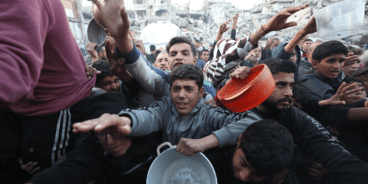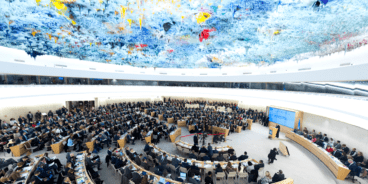
Global Centre Remarks at the Ministerial side event, “Towards inclusive societies: empowerment and education as a strategy to prevent genocide”
The following remarks were delivered by Dr. Simon Adams, Executive Director of the Global Centre for the Responsibility to Protect during the above-mentioned Ministerial side event during the opening of the 68th session of the UN General Assembly.
Thank you your Excellency. I would also like to thank the Ministers from Belgium and Ghana and other distinguished panelists for their comments. It is an honor to be invited here alongside you today as a representative of civil society.
I recall that the Special Adviser for the Prevention of Genocide and I both attended an emotional commemoration at Amahoro Stadium in Rwanda this April. Twenty years ago incitement and hate speech, most notoriously via Radio Mille Collines, played an essential role in fomenting and directing a genocide that consumed over 800,000 lives in just 100 days. As an entire people were vilified and dehumanized, targeted Tutsis were identified by name on the radio and marked for death. Rwanda reminds us that words can compel people to kill.
In the two decades that have passed since then there has been much debate about new technologies, education and the ways and means by which we can prevent mass atrocities. Some governments represented here have initiated programs to curtail hate speech, to educate and to legislate in support of open and inclusive societies. Freedom of speech should not mean freedom to incite hatred and murder, to deny genocide or to promote the politics of the machete, the mass grave or the gas chamber.
During the post-election violence in Kenya in 2007-2008 there was ethnic incitement on the radio, but hate speech also migrated to new platforms – including SMS messaging. In the aftermath of the violence the Kenyan government took commendable action in passing legislation and working closely with mobile telephone service providers to ensure that there would be no repeat during the 2013 elections. Moreover, government, civil society and international partners worked together to support educational programs that promoted social cohesion and “never again” messaging on the radio, via SMS and on social media. The elections were largely peaceful and successful.
We see similar dynamics in South Sudan today, where radio is a tool to incite and also to prevent atrocities. After armed rebels overran Bentiu during April this year they used radio broadcasts to call for sexual violence targeting ethnic Dinka civilians. But civil society has also used radio to create multi-lingual programs that promote diversity and consciously contribute to peacebuilding in this divided society. Young listeners of the radio drama Sawa Shabab (Together Youth) are also encouraged to use SMS to help mobilize their communities to prevent or ameliorate conflict.
Technology is neutral. But as the experience of Kenya and South Sudan reveal, any platform that can be utilized to incite hate can also be used to promote tolerance and respect. This is just one of many ways in which states can uphold their primary responsibility to protect populations in their country from the threat of mass atrocity crimes. In all societies, developed and developing, we need better programs for educating about hate speech, about the history of past atrocities, and about how together we can build societies that defend human dignity and enhance human rights.
Thank you.
Related Content


Atrocity Alert No. 429: Israel and the Occupied Palestinian Territory, Nicaragua and South Sudan
